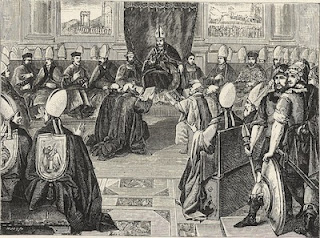The French army reached Hungary, where they were hosted by King Géza II of Hungary. Conrad was already there. Géza asked Louis to be godfather to his son, Stephen. Relations between France and Hungary remained cordial for a long time, and later on Louis' daughter Margaret would marry Géza's son Béla III of Hungary.
Eleanor of Aquitaine accompanied her husband on this journey—well, they traveled separately: Louis had taken a vow of chastity during the Crusade, and did not want to be tempted. She brought 1000 knights from Aquitaine and equipped a large retinue of women with horses and armor, dressed as Amazons. When they reached Constantinople, the men camped outside, while the women were entertained in palaces the likes of which Europe could not offer.
Constantinople had recently negotiated a treaty with the Seljuk Turks, and was now hosting a Crusading army that was going to enter Turkish territory and cause trouble. Some speculate that what happened next was due to interference by Emperor Manuel I Comnenos, who may have tipped off the Turks.
The European armies marched separately, Conrad going first. The French army encountered remnants of the Germans who warned that they had been attacked and defeated by Turks. Shortly after, Louis caught up with Conrad (who was wounded in the head) and the remains of his army. They reached Ephesus at Christmas, where Conrad decided he was too injured to continue. His foot soldiers stayed with Louis while the German nobles all went home.
The French army was then struck with four days of torrential rain that smashed their tents and washed away supplies. Louis chose to cross the mountains to get to Antioch as soon as possible. This put them in the path of Turkish raiders who threw rocks down and shot arrows at them. The parade-and-party atmosphere had faded for Eleanor and the ladies who followed her.
Another disaster arose, this one of Eleanor's making, and it almost destroyed the army. I'll tell you more tomorrow.







